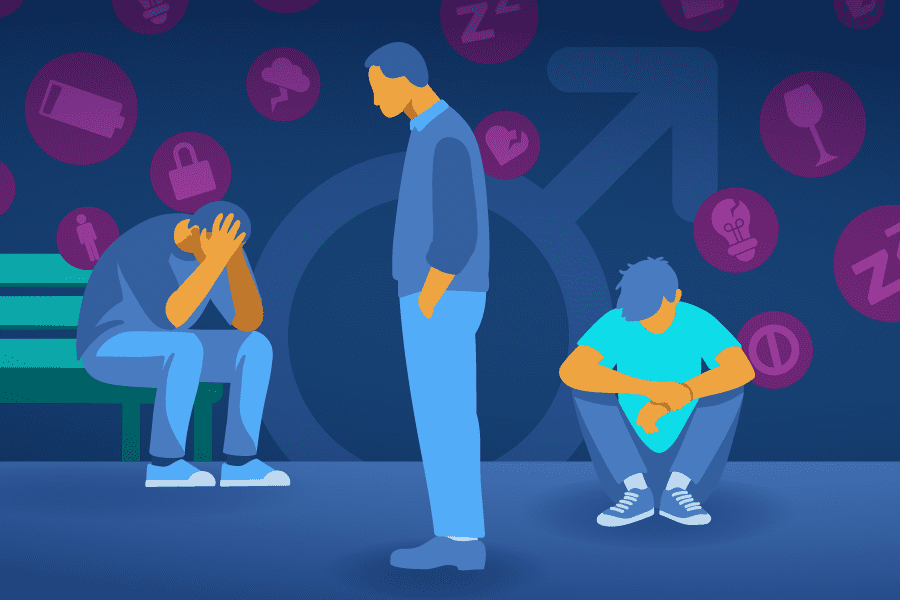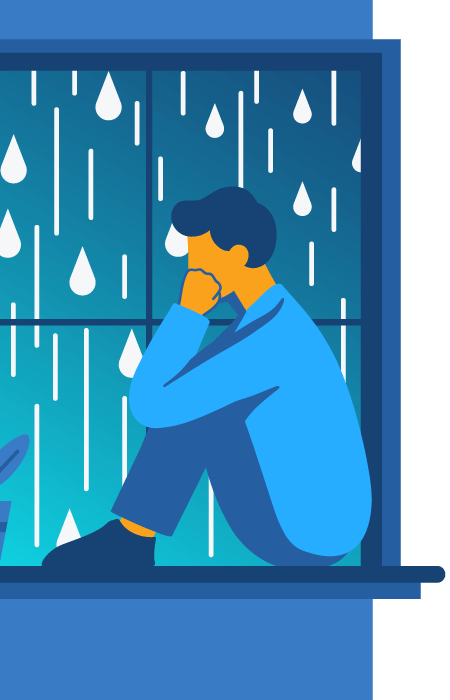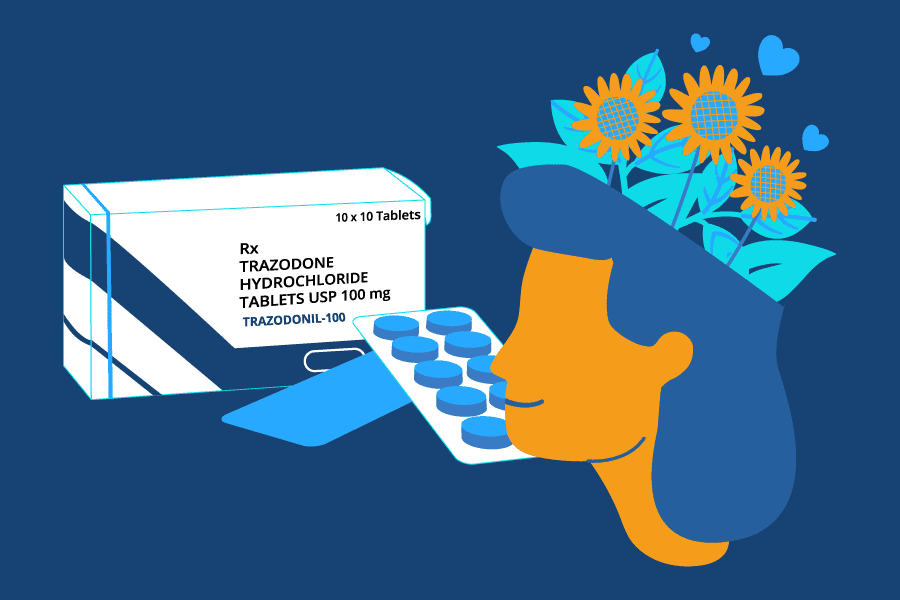Depression in Men Overview
How Many Men Suffer From Depression?
Approximately 6.2 percent of men are estimated to be living with depression or have experienced at least one depressive episode.
It’s important to note that this number only reflects those who have reported symptoms of depression.
Since many men feel hesitant to open up about their emotional challenges, it is safe to assume that the statistics of men suffering from depression underestimate how widespread the issue is.
Why Is Men’s Depression Overlooked?
Men’s depression is often overlooked because of cultural influences that push men to be “tough” rather than “emotional,” and create stigmas around seeking help.
Traditional masculinity can alter perceptions of men and men’s health, as men are often expected to just “be strong” and “get over it” instead of pursuing necessary help from a mental health professional or health care provider for their well-being.
While some men may feel stigmatized for talking about mental health, other men may not have been taught the signs of depression or its symptoms.
This makes identifying depression in their own lives difficult, and many men go without having a diagnosis as a result.
It is also easy to overlook depression in men when it does not show obvious external symptoms to people around the men who are struggling.
For example, many men repress outward signs of sadness like crying, which can make it difficult for loved ones to notice when they are struggling.
How Does Toxic Masculinity Affect Men’s Mental Health?
Toxic masculinity takes stereotyped expectations of gender to destructive levels that can ruin self-image, increase the risk of mental health issues, and encourage men to stay silent about their suffering.
Not only can toxic masculinity deny men effective ways of coping with or identifying mental health concerns, but it may also stigmatize mental health discussions for other men.
Fear of being perceived as “weak” can overshadow healthier ways of processing emotional needs.
Feelings of depression, anxiety, anger, compromised self-care, and more are all common due to toxic masculinity and can introduce these side effects into entire families or communities.
As mental health needs are avoided over time, men can fall further into feelings of anger, depression, suicidal ideation and other health problems.
They may also turn to self-destructive behaviors like substance use or drug and alcohol addiction to try and cope with the emotions they are hiding.
Causes of Depression in Men
While there is no single cause for depression in men, environmental and genetic factors can put a man more at risk of mental illnesses such as depression or anxiety.
Most men experience a combination of many risk factors that lead to this looming “dark cloud” feeling.
What Are the Reasons for Depression in Men?
Some of the reasons for depression in men include:
- Genetic predisposition to depression
- Lack of social or societal emotional support
- Traumatic life events, such as feelings of loss or grief, being a victim of bullying, and more
- A feeling of physical or emotional isolation
- Difficulty talking about emotions or lack of a safe space to discuss emotional needs
- Other mental health disorders or medical diagnoses that impact daily life
- Lack of self-care
Each of these can be challenging for men addressing feelings of sadness or who experience depression.
Lack of self-care outlets can also birth unhealthy and dangerous coping strategies to address feelings of sadness, such as substance abuse, which can then worsen the effects of depression.
Likewise, traditional masculine roles and stigmas can make it difficult to discuss emotional needs, leaving many men to feel as if they have to address these concerns alone, furthering the impact that depression has on daily life.
Can Men Get Postpartum Depression?
Yes, men can experience postpartum depression, known as paternal postpartum depression, in the months after a child’s birth.
While it’s often associated with women, men also face emotional and psychological challenges during this time.
Hormonal changes, increased stress from new responsibilities, and feelings of inadequacy as a father can contribute to depression and depressed moods.
While postpartum depression in fathers is usually circumstantial and fades within a few months after the baby is born, for some it is a sign of long-term, clinical depression.
Additionally, men may be less likely to seek help or talk about their struggles.
They may hesitate to open up to their partner – especially if their partner is also finding the transition difficult.
The burden of being “the rock” or “the strong one” can often be placed on men, making them feel guilty for opening up about experiences like paternal postpartum depression.
Symptoms of Depression in Men
What Does Depression Feel Like For Men?
Depression in men can sometimes feel different than it does for women, often showing up as anger, irritability, or frustration rather than sadness.
Men might feel emotionally numb or disconnected, unable to enjoy things they once found fulfilling.
They might also struggle with restlessness, low energy, or a sense of being overwhelmed.
Physically, men with depression often experience fatigue, sleep problems, or changes in appetite.
These feelings are difficult to navigate, and many men may feel as if they cannot reach out for help from a mental health professional or even a friend or family member to address these feelings.
Left unaddressed, suicidal thoughts, substance use, and other risky behaviors can become even more common.
Sandstone Care can help family members and loved ones create a space to challenge the prevalence of stigmas and promote professional help.
How Do Men Tend to Show Symptoms Of Depression?
Men tend to show symptoms of depression more commonly through anger, silence, and frustration.
Many men lash out in anger, especially if they have not been taught effective coping strategies to validate or lack a space to express feelings of depression.
Women will sometimes experience these same symptoms of depression.
However, the stigma against men seeking help for their emotional struggles can sometimes cause more severe outbursts since they have been repressed for so long.
Some signs of depression in men include:
- Anger, irritability, and frustration
- Increase in risky behaviors
- Substance use and substance abuse
- Social isolation or withdrawal from social events or family members
How Does a Man Act When He Is Depressed?
Each man may act differently when they are depressed, but it is common to act irritated, withdrawn, or uninterested in things they used to love.
In cases of severe depression, a man may also experience difficulty accomplishing their daily responsibilities.
This can look like neglecting household chores, struggling to manage emotions, avoiding work, and more.
How Do Men Show Sadness?
Men who experience depression may not necessarily have the skills to express feelings of sadness effectively, instead they may show sadness with risky behaviors, anger, or isolation.
Anger over small things, engaging in consistent and constant escapist behavior, or an increase in risky behavior are all common.
Is Not Crying a Sign of Depression?
On its own, an inability or unwillingness to cry in front of others is not necessarily a sign of depression.
Some people may naturally cry less due to personality, upbringing, or cultural influences.
However, for some men, not crying or feeling emotionally “numb” can be a symptom of depression.
Depression often causes a blunted emotional response, where individuals may feel disconnected from their feelings, including sadness, which makes it difficult to cry even when they want to.
Why Am I So Emotional As a Man?
Emotions are completely normal, even among men. It is okay to feel emotional.
Expressing feelings of sadness, anger, frustration, grief, happiness, excitement, and more are all part of being healthy.
Feeling more emotional than usual, however, can be the result of new additional stresses, lack of self-care, sleep, and proper dieting, or changes to either a person’s home or workplace environment that may be impacting a man’s mental health.
Physical Symptoms of Depression in Men
How Does Depression Affect a Man’s Body?
Depression can affect a man’s body through:
- Fatigue
- Muscle aches
- Digestive problems
- Headaches
Men may also express these challenges more openly than the emotional symptoms of depression, making recognizing the physical effects of depression in men important.
Some men experiencing depression may also be at an increased chance of heart disease.
Talking to a healthcare professional about feelings of depression can help explore holistic healing.
Can You Physically Tell If a Man Is Depressed?
There is no way to look at a person and tell for certain if they are depressed.
However, there are physical symptoms of depression.
Recognizing these symptoms can prompt family members and loved ones to explore other signs of depression and potential treatment options.
Does Depression Cause Fatigue in Men?
Yes, depression can cause fatigue in men.
Depression can cause low levels of energy, loss of interest, and even difficulty sleeping, making it difficult to replenish this energy.
Does Depression Cause Memory Loss in Men?
Men living with severe depression may experience memory loss as a symptom of their mental health condition.
However, it is not unique to men, as women can also experience memory loss.
Signs of Depression in Young Men
What Does Depression Look Like in Young Men?
Depression in young men may look like mood swings, fatigue, and being easily irritated.
The symptoms and effects of depression can look similar at any age, from periods of low mood to feelings of sadness, worthlessness, and hopelessness.
However, among young men, mood swings and anger can be exceptionally prevalent, especially given the intense stresses that many young men face, from academic stresses to societal pressures.
In the most extreme cases, young men may turn to self-harm or attempt suicide to try and escape the pressures that they feel that they are under.
When Does Depression Peak on Men?
Undiagnosed depression oftens peak in men around 40 to 50 years, even contributing to the effects of midlife crisis.
However, every person with depression will have a unique experience with the medical condition.
Many men will have their depression “peak” as teenagers or as they enter retirement.
At What Ages Do Men Feel Depressed?
Depression can be diagnosed from a very early age, even as early as three years old in some cases.
Men will also have their own experiences that trigger depression, especially if tied to substance use, traumatic experiences, and more.
In teen years and early adulthood (ages 15-25), men may feel depressed due to pressures related to identity, career choices, or fitting in socially.
Hormonal changes during adolescence also affect mood, making this a sensitive period for mental health struggles.
In middle age (ages 30-50), men often face stress from work, relationships, or feeling like they haven’t achieved their life goals.
Life changes like divorce, job loss, or the death of loved ones can also trigger depression during this time.
In older adulthood (ages 60 and up), men may experience depression due to health problems, retirement, isolation, or a loss of purpose.
Men from older generations might also avoid seeking help because of the stigma surrounding mental health, making depression more common but less often treated.
Depression can continue to negatively impact daily life until reaching out for help from a mental health professional to explore treatment options and get the health information they need.
This means that depression can be a consideration at any point in life.
Is Depression Worse for Teenage Boys?
While depression in teen boys is about the same intensity on average as in other groups, teen boys can experience unique challenges as their brain develops.
A lack of emotional support, pervasive stigmas, social stresses and atmospheres, societal pressures, and lack of education on how to safely process and navigate feelings of depression can be exceptionally challenging.
Coping Mechanisms of Depressed Men
Is It Okay For Men to Cry?
Yes. In fact, crying is often healthy for men.
The idea that men should not be allowed to cry largely comes from unhealthy societal expectations and traditional masculinity roles.
Denying men the space to cry can lead to repressed emotions and further mental health problems such as depression.
Why Do Men Go Silent When Upset?
Some men may go silent when they are upset because they do not know what to say to express what they are feeling.
Many men are not taught how to identify or share their emotions at a young age, and most do not have the chance to learn when they get older before they are taught that sharing feelings makes them “less manly.”
Why Do Men Suppress Their Emotions?
Many men may suppress their emotions because they are afraid of being judged or seen as weak.
Many men are also hesitant to share their feelings because they don’t want to be seen as “feminine.”
What Are Healthy Ways For Men To Cope With Depression?
Healthy ways for men to cope with depression include:
- Maintaining a healthy diet and sleep schedule
- Engaging in self-care
- Avoiding substance use
- Acknowledging feelings, either through talking to a trusted family member or loved one or beginning to explore personal emotions in a more private setting, such as journaling
- Reaching out for professional help or therapy
Those with severe depression may find it difficult to take care of themselves.
It is important to have a supportive home atmosphere that allows men to express emotional needs and feelings without feeling judged.
Calling a treatment center or mental health hotline can also provide more ideas on how to cope with depression.
Depression in Men Vs. Women
Are Men More Depressed Than Women
Men and women experience depression at similar rates. However, women are more likely to be diagnosed with depression as they are more likely to reach out for help than men.
Does Depression Affect Men and Women Differently?
Yes, depression often affects men and women differently, both in terms of symptoms, risks, and how they cope with the condition.
- Symptoms
Women with depression are more likely to express sadness, hopelessness, and guilt, and they may cry more frequently.On the other hand, men are more likely to experience irritability, anger, or frustration, and they may be less likely to express emotions openly.
- Suicide risk
While women are more likely to attempt suicide, men are more likely to die by suicide due to using more lethal methods.This highlights the importance of recognizing depression in men, even if it presents in less traditional ways.
- Coping mechanisms
Men may feel more pressured than women by societal expectations to suppress emotions and “tough it out,” leading them to delay seeking support.Men may also engage in reckless or self-destructive behaviors, such as substance abuse or excessive working, to cope with their feelings.
Who Is Most Likely to Show Symptoms of Depression?
Generally, it is more socially accepted for women show obvious symptoms of depression than men in the United States.

Is this blog hitting close to home?
We’re here to help.
Depression in Men and Relationships
How Do Depressed Men Behave in Relationships?
Men with depression may withdraw from personal relationships, including those with family members and friends.
Men who may lack healthy ways of addressing depression may also lash out in anger or sadness, even when faced with low levels of stress.
Who Do Men Talk to When They Are Depressed?
Many men may find it difficult to talk to others about depression, even close family members and loved ones.
Contacting a dedicated mental health professional to discuss depression in a safe space or to learn how to create an inviting atmosphere at home to talk about depression may be necessary.
How to Deal With a Depressed Husband
Some ways to support a husband with depression include:
- Creating a safe space by encouraging him to share openly
- Educating yourself about the signs and symptoms of depression
- Understanding the role of substance use and removing addictive substances from the home
- Locate local treatment facilities or support groups that understand the needs and challenges of men
Men’s Depression Treatment
How to Treat Depression in Men
Some ways that mental health professionals can help treat depression in men include:
- Psychotherapy or talk therapy
- Cognitive-behavioral therapy (CBT)
- Suicide prevention
- Trauma-informed treatment options
- Community healing and group therapy
- Transcranial magnetic stimulation
Traditionally options included things like electroconvulsive therapy (ECT) for severe depression, bipolar disorder, and suicidal thoughts.
Now it is more common to prescribe antidepressant medications, typically SSRIs, to address symptoms of depression.
Talking with a professional is the best way to explore which treatment option and medication is best and explore the severity and impact of depression on daily life.
How Long Does It Take for a Man to Get Over Depression?
On average, men who are getting treatment for depression can start showing positive effects within 6 to 12 weeks, but long-term recovery may take several months or even years.
The time it takes for a man to recover from depression varies widely depending on several factors, such as the severity of the depression, the type of treatment, and the individual’s personal circumstances.
For some men, symptoms may improve within a few weeks or months.
Others may take longer, especially if their depression is more severe or has gone untreated for a long time.
However, with proper support, antidepressant medication, and professional mental health treatment, many men start feeling significant and sustainable improvements within a few weeks.













